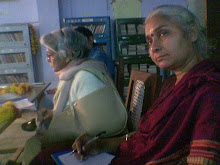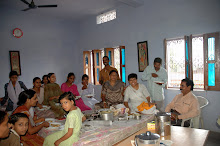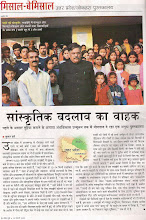Cultural Activities :
The year 2006 proved to be very eventful for the organisation specially in the field of theatre,music and promotion of book reading.During the year three training cum production drama camps were organised .The first camp from 2nd to 20th February was conducted by Abhishek Pandit , a local theatre activist and girls and boys from surrounding villages participated in it. The production of the camp Andher Nagari ,written by Bhartendu Harishchandra and adopted by Abhishek Pandit , was staged in 6 villages surrounding the library.One show of this production was also staged in Rai Umanath Bali Auditorium ,Lucknow on 24th of February,2006.It got wide appreciation from the media and spectators.
IPTA(U.P.) organised another theatre camp from 4th June to 30th June ,2006.It was inaugurated by Sri Jitendra Raghuvanshi , national general secretary of IPTA and Sri Yugal Kishor, Faculty member of Bhartendu Natya Academy , Lucknow was the main resourse person.It was a residential camp in which 27 boys and girls of Azamgarh, Mau , Ghazipur , Jaunpur and Sultanpur districts participated.. The play Inspector Matadin Chand Par, adopted from the story of Harishankar Parsai , was prepared in the camp and was staged at the District Headquarter of Azamgarh and in three villages.
During winter vaccations from 25th of December 2006 to 7th of January 2007 , third camp was organised .This time it was decided that the regular participants of previous camps organised by NSD New Delhi, NCZCC Allahabad ,BNA Lucknow and IPTA (U.P.) should be encouraged to conduct the camp themselves and without any external assistance.This experiment was successful and not only the rural participants adapted certain stories but also wrote the dialogues and designed the stage and costumes.Local talent Vindra successfully directed the play.Many shows of the play was organised in the libray and adjoining villages.
Regular classes of music was conducted during the whole year.A local folk dance form Dhobia was given special attention and Parbhu and old and perhaps the last practicing dancer in the surroundind villages was encouraged to pursue his love of the life.The troupe of the library toure many districts of Hariyana in the months of May and June 2006.
About 700 more books were added to the library.New readers specially women joined it.The Little magazine section attracted large number of research scholars from Gorakhpur University, Banaras Hindu University and Allahabad University.
The Film society run by Library , exhibited two good films every week to the villagers.Thirty four new films were added to its collection this year.Children's Film Society of India,Mumbai , organised a two day's workshop cum exhibition of Children's Films.This was a life time experience for the children of rural areas.Sri Sanskar Desai, himself a noted Children's film maker, was the resource person.
Activities Related to Gender Sensitization :
With the help of OXFAM, an international donor agency the library sensitized the men and women of the area on gender issues. On the issue of violence against women a national discourse was organised which was inaugurated by Medha Patekar on the International Women's Day (8th March 2007).
Activities Related to skill up gradation and income enhancement :
Through out the year the organisation ran various programmes of skill up gradation .A well equipped computer center is being run by the organisation in its own premises where more than 80 boys and girls , mostly from the weaker sections of the society are under going various computer education programmes. A typing institute is also being run by the organisation which is imparting typing skills to the rural youth. Another training facility is enabling women of the adjoining villages to learn stitching and tailoring .A training programme supported by Nehru Yuwak Kendra is providing 30 local boys an opportunity to learn the skills of scooter and motorcycle mechanic. These skill up gradation programmes help local youth to start their own income generating ventures.
NABARD is supporting a programme of forming Women SHGs and their linkages to bank.
Click Here!
sri ramanand saraswati pustkalaya
Subscribe to:
Post Comments (Atom)
Women dare to ask question:
The mundane and routine life of Prabhawati had always been on the receiving end. Poverty, ill treatment of in laws and regular beating by a drunkard husband Bhagwat were all she could remember till she met Kusum and Pushpa, two activists on gender issues. SRSP, with support of OXFAM, has initiated a campaign against gender violence in fifteen surrounding villages. Prabhawati's village Sahnupur is one among these. She learnt the art of protest during interaction with Kusum and Pushpa and that was the beginning of the end of accepting cruelty without asking questions. "How dare you ask question" was the reaction of Bhagwat, with a sense of disbelief on his face, one day when he slapped her and a defiant Prabhawati asked uncomfortable questions. Since then Prabhawati never looked back. She giggles while narrating, before women participants in a discourse on gender, how she reacts to the violent behaviour of her husband and how much he fears raising his hands on her because he knows that she will pay him back in the same coins. Prabhawati is one of many women of different age groups who regularly attend various capacity building programmes and discussions organised by SRSP. These exposures have taught them to ask questions and not to accept violence against them in different forms and at various levels.
Letters from a Goa prisoner to writers: Sumant Bhattacharya in Indian Express of 18 th January 1998
NEW DELHI, January 17: From his tiny cell in Goa's Central Jail, Sudhir Sharma, Inmate No 797, has been fighting a long and lonely battle: he wants to read. The Constitution and the Supreme Court say he has the right to do so, his prison authorities say no.Sharma, a former addict, was arrested in 1993 and sentenced to a 10-year jail term under the Narcotics Act. While in prison, one day, a fellow inmate showed him a copy of Pahal, a monthly Hindi literary magazine. It was this that, Sharma says, gave him a reason to live.
He wrote to Pahal editor, noted Hindi writer Gyanranjan, who sent him his books. They reached the jail but authorities said he couldn't read them. The books were sent back and Sharma was moved to a sub-jail, in Vasco, where, he says, the conditions are worse.
Still, he keeps writing letters, to Gyanranjan, Hindi novelist and DIG of Border Security Force, Vibhuti Narain Rai; authors Nirmal Varma, S R Yatri and Asghar Wajahat. These letters aren't sent through ``official channels'', he smuggles them out, sometimes through an inmate on his way to the hospital, a friendly warden or an inmate's relative. In his latest letter to Rai on December 10, 1997, Sharma says he's perhaps paying for raising his voice.
The story of his life, as told through his letters: Once a student of Delhi University, Sharma left home for Mumbai. He began working for the underworld don Karim Lala's nephew Samad Khan, fell in love with a ``penfriend'' from Jodhpur. Things changed when Samad Khan was killed and his girlfriend ditched him. Sharma became an addict and began to peddle drugs until he landed in jail.
He clocked his days in despair until he read Pahal. ``Pahal ke ank ne meri zindagi mein pranvayu ka sanchar kiya,'' he writes in a letter to Rai. (Just one issue of Pahal gave me a fresh lease of life). He goes on to thank Gyanda (Gyanranjan) for accepting a prisoner as a reader. ``Thank you for agreeing to share your books with a criminal. I know I have done something wrong but I am conscious. Don't I have the right,'' he asks, ``to know what's going on, to be sensitive?''
Books and magazines came pouring in which jail authorities confiscated. He also wrote to Kiran Bedi. In a letter, he says he believes that his persecution by the jailer was largely due to his attempt to spill the beans in the letter to Bedi.
The IG (Prison), Goa, and the superintendent of the Central Jail in Aguada, quoted the jail manual to justify their action. In a letter to Rai dated July 8, 1996, the superintendent says:
"In view of Rule 17 of the Goa Daman and Diu Prisons (Facilities to the prisoners) Rules 1968, the parcel which was sent by you was refused by this jail."
According to this rule, prisoners' mail, both incoming and outgoing, "shall be carefully censored." And a prisoner may be asked to give "a list of persons with whom he is likely to correspond during his period of imprisonment. As far as practicable, this list shall be scrutinised."
Jail authorities claim that since these authors' names don't figure in this list, he cannot receive anything from them.
This despite a 1979 ruling by a Supreme Court bench comprising Justices V R Krishna Iyer, R S Pathak and O Chinnappa Reddy. The judges had said: "No prisoner can be personally subjected to deprivations not necessitated by the fact of incarceration and the sentence of the court. All other freedoms belong to him, to read and write... to creative comforts... to movement within the prison campus subject to the requirements of discipline and security, to the minimal joy of self-expression, to acquire skills... all other fundamental rights tailored to the limitations of imprisonment."Speaking to The Indian Express, G H Kenaudekar, additional Deputy Collector and Deputy IG (Prison), Goa north, says: "As per rules, books will not be given to prisoners but will be kept with jail authorities." When told of the Supreme Court's ruling, he says that probably the jail administration is not aware of the decision.
Ironically, the books sent to Sharma by Kiran Bedi, who was given the Magsaysay award for reforms in Tihar jail, were also returned. Says Bedi: "The Goa jail administration has overlooked the verdict and directions of the Supreme Court. It should be brought to book for this." Until that happens, Inmate No 797 will keep waiting -- and writing.















.jpg)













No comments:
Post a Comment